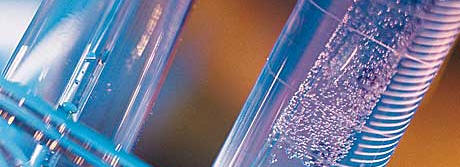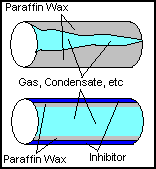
|
Eugene Dakin Ph.D., P.Chem Professional Chemist
|
|
|
|
|
Paraffin Inhibitors Paraffin Inhibitors prevent further buildup of the viscous paraffin wax from agglomerating equipment. Some crude oils with high levels of paraffin are so viscous that travel in pipelines during the winter months is almost impossible.
Crystallization of this material can buildup in a production string to the point that it can kill a well.
Usually, low levels of paraffin inhibitors (400 ppm to 1000 ppm) are continuously injected to prevent this sticky material from adhering to production lines.
The following diagram displays the effectiveness of a production string with, and without a paraffin inhibitor that is producing a fluid with a high level of paraffins.
The untreated (top) line has a gradual buildup of Paraffin Wax which eventually chokes the production flow (Gas, Condensates, etc).
A line treated with a Paraffin Inhibitor forms a protective layer between the sticky paraffin wax and the outer metal lining. This action inhibits the paraffin from physically attaching to the line and maintains free flowing production of produced chemical fluids.
Further research is being performed to chemically treat or chemically modify the metal matrix to lower the adhesion properties of production string metals. This is in the field of metallurgical chemistry.
Contact Eugene for more information.
|
|
| © 2006 - Eugene Dakin -
|

